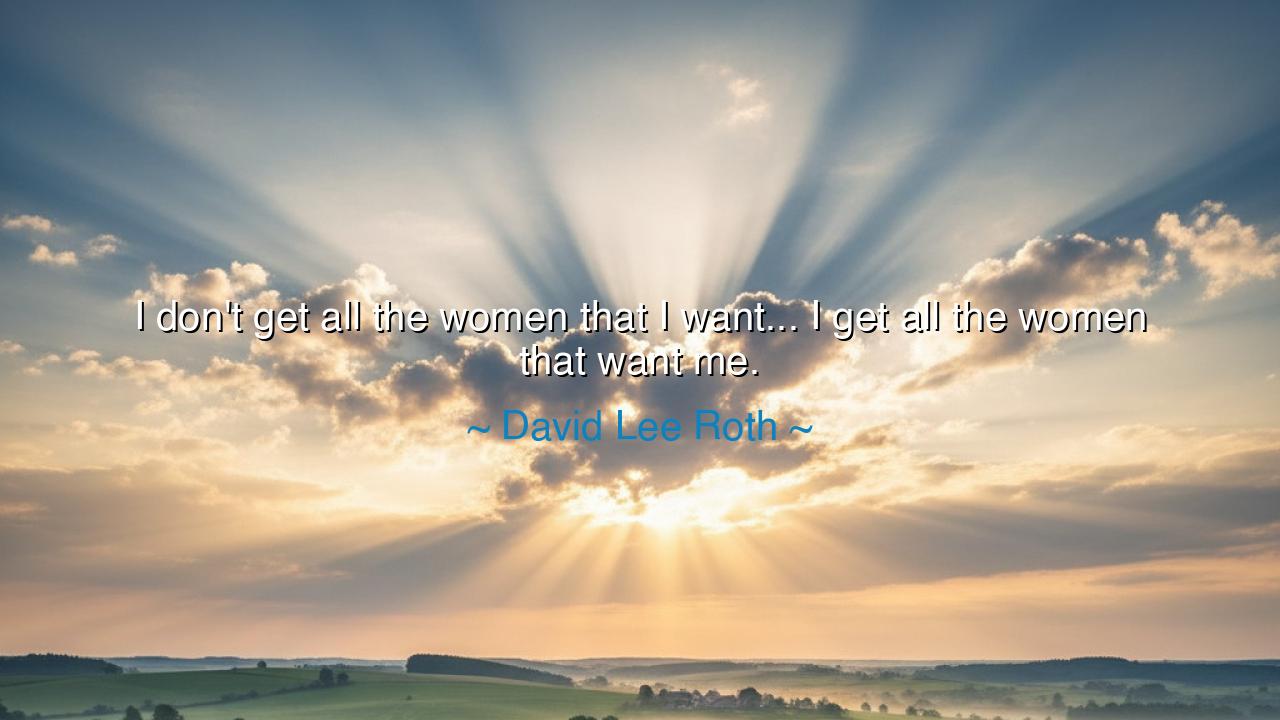
I don't get all the women that I want... I get all the women






The words of David Lee Roth, “I don’t get all the women that I want… I get all the women that want me,” shimmer with wit, yet carry within them a truth about desire, fate, and human connection. In them, Roth admits that the will of another cannot be bent by force or longing; one may hunger for much, but only that which freely turns toward you is truly yours. His words remind us that conquest is hollow without consent, and that power in love lies not in taking, but in being chosen.
In the spirit of the ancients, this wisdom is profound. Desire often drives men to believe they can claim what they will, that wealth, beauty, or status entitles them to possession. But Roth’s statement flips the conceit: the measure of love is not what you want, but who wants you. The women who come of their own accord bring authenticity; their choice is a crown higher than any taken by force. Thus, the boast is not of conquest, but of attraction freely given.
History bears witness in the tale of Mark Antony and Cleopatra. Antony, though mighty in Rome, did not seize Cleopatra by power. Rather, it was she who chose him, drawn to his spirit and daring. Their union, though fated for tragedy, revealed this truth: it was not that Antony got the woman he wanted, but that Cleopatra, in her majesty, wanted him. In her choice lay his triumph, and in that mutual desire, they forged a bond that shook empires.
Roth’s words also carry humility hidden within bravado. To confess that one cannot have all that one desires is to accept the limits of mortal will. But to embrace what is given—to revel in those who freely turn their gaze toward you—is to live in gratitude rather than frustration. It is the ancient balance between striving and acceptance: chase what you will, but cherish most what is offered.
So let this wisdom be passed down: in matters of the heart, to be wanted is greater than to merely want. The true victory is not in the pursuit of countless conquests, but in the joy of mutual desire. For in the end, love is not about possession, but about recognition—when two souls, of their own will, turn toward each other and say, “You are mine, and I am yours.”






HHieu
Roth's quote seems to reflect his charismatic persona, but it also raises a concern about objectifying relationships. If you only focus on the people who are attracted to you, does that limit your ability to form real, meaningful connections? How do we balance the excitement of attraction with the importance of emotional and intellectual compatibility in a relationship?
CMTran Cong Minh
While Roth’s quote might reflect his carefree attitude towards relationships, it also presents a somewhat shallow view of romantic interactions. Is it healthy to focus on who wants you rather than who you connect with on a deeper level? Can this mindset lead to genuine and lasting connections, or is it just a temporary confidence boost based on external validation?
GBgiau bui
David Lee Roth’s quote comes off as both confident and a bit dismissive of deeper emotional connections. Is this just a reflection of a certain lifestyle, or does it suggest that the speaker values attraction and validation over actual meaningful relationships? Are we prioritizing physical attraction over emotional compatibility, and if so, what does that say about our views on love and connection?
NTTHAO TRAN NGOC THANH
Roth’s statement strikes me as somewhat cynical, reducing relationships to a game of who is wanted rather than who you genuinely connect with. If someone is only interested in the women who desire them, does that mean they're overlooking the importance of emotional compatibility? Shouldn’t relationships be more about mutual respect and shared values, rather than playing into the dynamics of attraction alone?
UGUser Google
While Roth’s quote may seem playful or boastful, it also raises questions about how we value relationships. By framing romantic connections in terms of ‘getting’ someone, is he reducing the complexity of human interactions to mere conquest? Shouldn't relationships be about more than just mutual attraction or desire? How can we move beyond this mentality to foster deeper, more meaningful connections?